- Jan: Day 1 (17/1/18)| Day 2 (18/01/18) | Day 3 (23/01/18) | Day 4 (24/1/18) | Day 5 (30/1/18)
- Feb: Day 6 (1/2/18) | Day 7 (6/2/18) | Day 8 (7/2/18) | Day 9 (8/2/18) | Day 10 (13/2/18) | Day 11 (20/2/18) | Day 12 (21/2/18) | Day 13 (22/2/18)
- Mar: Day 14 (6/3/18) | Day 15 (7/3/18) | Day 16 (13/3/18) | Day 17 (14/3/18) | Day 18 (15/3/18) | Day 19 (20/3/18) | Day 20 (21/3/18) | Day 21 (22/3/18) | Day 22 (27/3/18)
- Apr: Day 23 (3/4/18) | Day 24 (4/4/18)
This post is essentially a compilation of tweets from Gautam Bhatia, Prasanna and SFLC to understand how the Aadhaar hearing happened in the Supreme court.
Day 25: 05 April ’18
Attorney General K.K Venugopal arguing for the state.
- Hearing continues.
- Attorney General continues his arguments.
- Continues reading from the note on biometrics. Reading from page numbered 261 on biometrics
- US Court of Appeals case. Deals with DNA storage of arrested persons.
- Chief Justice of India cautions Attorney General that this does not apply in this case as it is narrowly deals with offenders.
- Attorney General says he wants to read the portion relating to retention of DNA.
- Chief Justice of India allows him to continue reading.
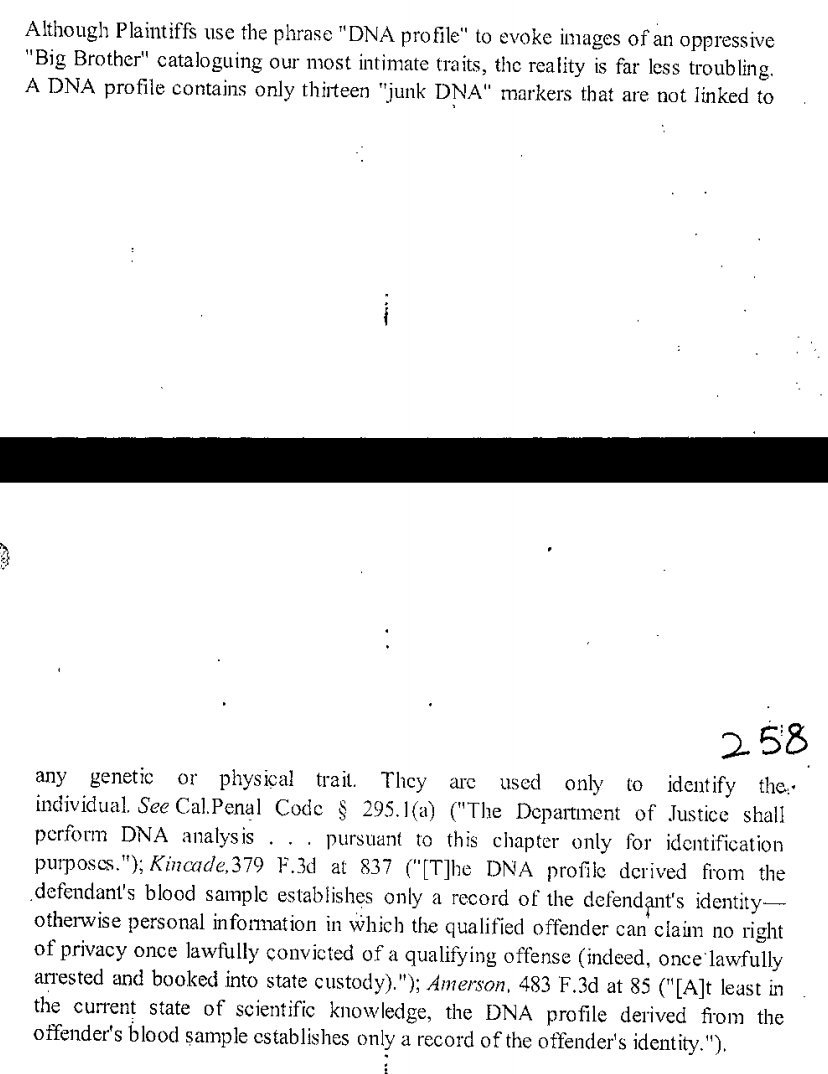
- Attorney General: Court shall not base its reasoning on Hollywood fantasies.
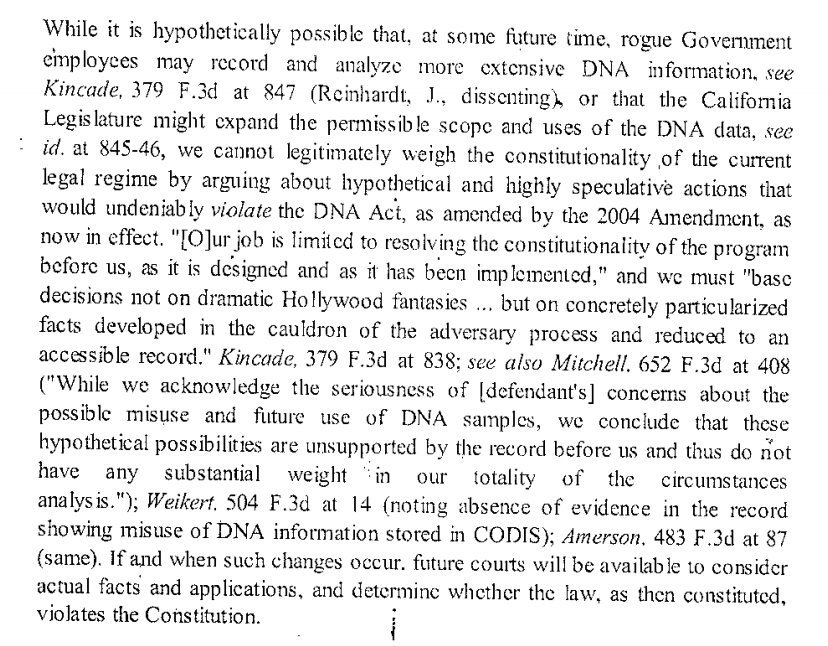
- Justice DY Chandrachud says this does not arise in our case. We are not worried about misuse but we are worried about the use of power under 2 (g) of the Act. Leaving it to an administrative authority to define biometrics may not meet the proportionality test.
- Attorney General says he will meet that point. He paraphrases it as an excessive delegation point.
- Next reads a Fordham Law Journal article on how automated finger imaging does not violate privacy.
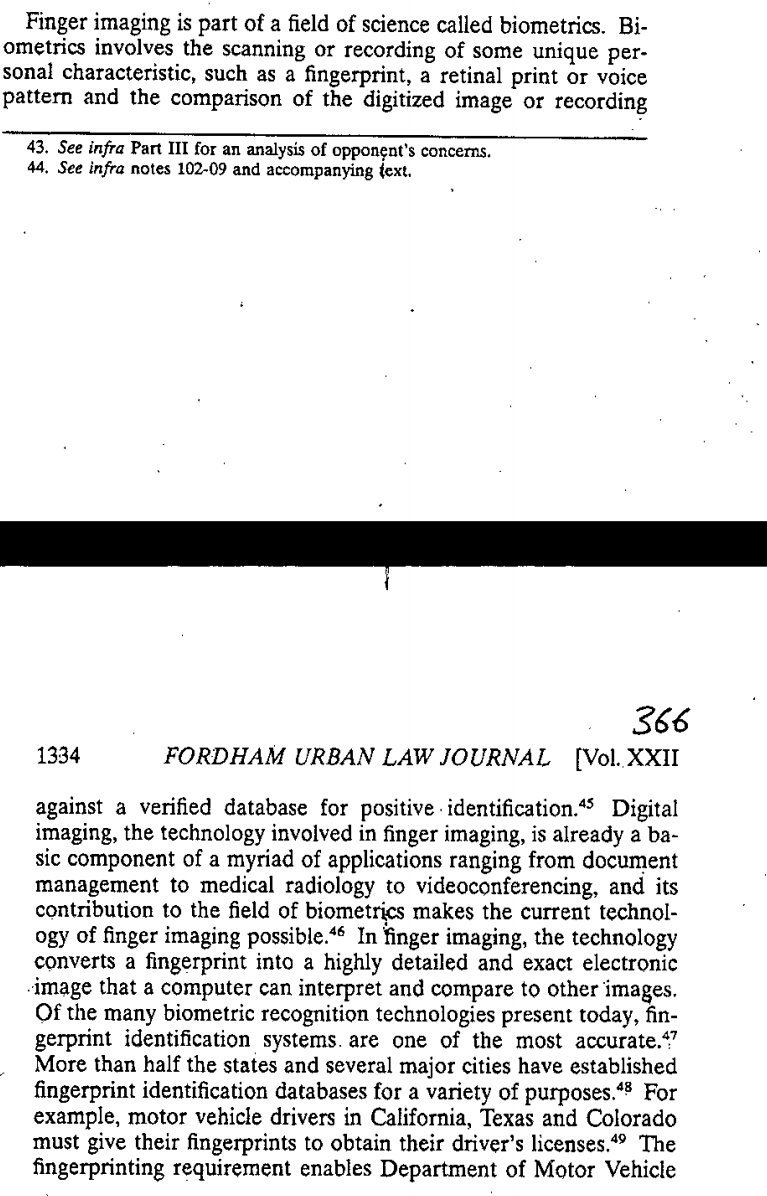
- Emphasises the part in the article that asserts that finger imaging technology is 99.9% accurate.
- Reads the following passage from the same journal note.
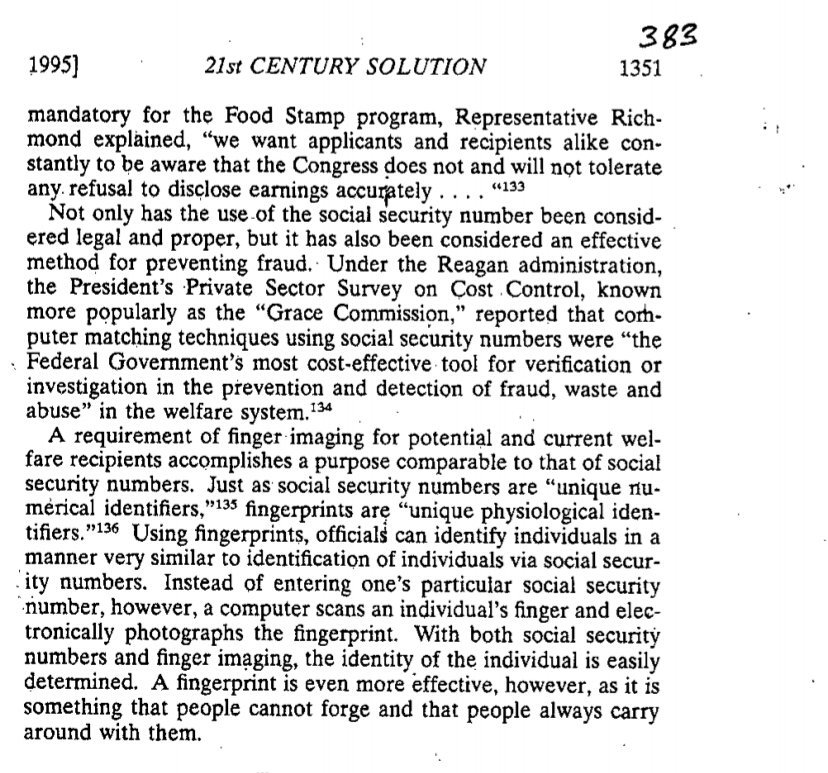
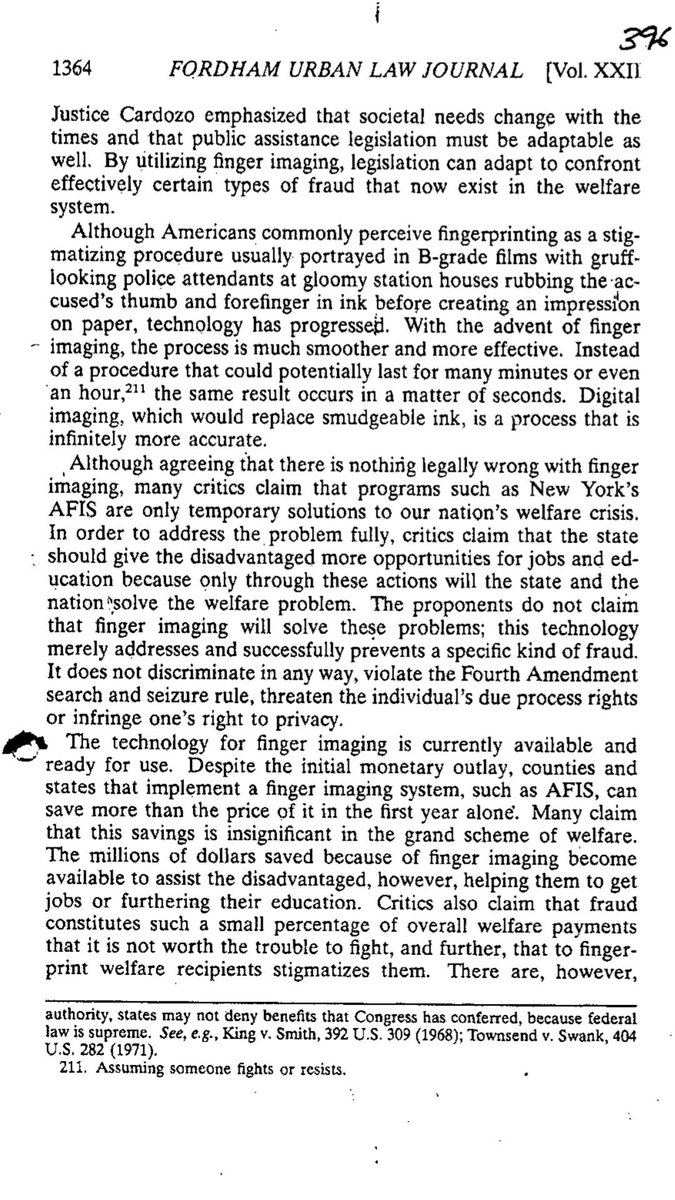
- Says watching television every day is shocking…crime on the rise every day. Bank frauds total in lakhs of crores. This will catch them all. Submits that biometrics is a very safe and accurate technology. Says biometrics can problems such as money laundering, bank frauds, income tax evasion etc.
- Next reads a Fordham Law Journal article on how automated finger imaging does not violate privacy.
- Justice Sikri laughingly says Bank frauds has got nothing to do with this. Says that bank frauds weren’t caused because of multiple identities.
- Attorney General responds by citing benamis multiple identity based frauds.
- Justice DY Chandrachud also joins Justice Sikri and says nothing in Aadhaar prevents an individual operating a layer of commercial entities to do a chain of transaction. Can’t see how Aadhaar is going to help with detecting or preventing bank frauds. Say Section 7 frauds understandable at most.
- Mere legitimate state interest does not ensure proportionality. Your submission lacks this nuance.
- Attorney General now tries to justify based on vast majority are deprived in India etc. says that Aadhaar will help in income disparity and eliminating poverty.
- Justice Sikri says inequality is increasing. No question of India having bridging inequalities. Says that the gap is widening. More than 70% wealth is in the hands of 1%.
-
Some debate on Trickle down economics. Attorney General refers to Gurucharan Das and Justice Sikri referring to Prof Amartya Sen.
- Justice DY Chandrachud says legitimacy of the interests involved here is a given. But the crux lies in proportionality. How far can the state cast a net? Only section 7 seems to be understandable.
- Justice Sikri says you cannot assume that the entire population consists of defaulters and violators. Takes the example of mobile Aadhaar linking.
- AG says terrorism will be curbed by doing this.
- Justice Sikri says what is the proportionality in suspecting everyone to be a terrorist.
- Attorney General responds taking the example of Kashmir and says they shutdown internet to ensure stone throwers don’t communicate with each other and assemble.
- Justice DY Chandrachud asks which terrorist applies for a cell phone? They may use…but do they apply? It’s a problem that you’re asking the entire population to link their mobile phones with Aadhaar.
- Attorney General says that we are asking for minimal information via Aadhaar. Says most information is already available in public domain.
- ays that the question is to what extent has Aadhaar invaded privacy? Says it’s as minimum as possible.
- Bench rises for lunch.
- Attorney General resumes his submissions.
- Says Aadhaar is required only for section 7 benefits, banks, income tax and mobile numbers. Apart from that it’s purely voluntary.
- Emphasizes that linking Aadhaar with mobile no.will help in curbing terrorism.
- Says court needs to balance two competing rights. Maintains that right to food, right to employment, right to medical care, etc trump right to privacy.
- Can right to privacy be invoked to deprive other sections of the society, he asks.
- Repeats that the invasion to privacy is so minimal that it can’t even be considered an invasion. Cites X v. Hospital Z wherein right to privacy was balanced against right to information. The appellant ( a man) had HIV and had the right to non disclosure. However, the court had held that his fiance had the right to know of his disease.
- Justice Sikri: this is the case of balancing the rights of two person. In the case of Aadhaar, you’re giving a person food in exchange of their privacy.
- Attorney General says that the bare minimal requirements for identification for an individual is alone taken and to the extent that the technology permitted.
- Should people have basic right to life under article 21? Can it ever be challenged on the ground that we have a right to privacy, he asks.
- Justice Bhushan: Minimal invasion is subjective. What maybe minimal for you might not be minimal for others.
- Attorney General asks the bench to look at the information that is taken and look at it from objective standards. We have to look at the larger interest of the country.
- Justice Chandrachud: we have to look at three things: informed consent, purpose limitation, and enough security.
- Attorney General: The CIDR is completely safe.
- Justice Chandrachud: we have to look at what proportionality means. Proportionality hasn’t been defined in the Puttaswamy judgement.
- Attorney General says that without the minimal information that is collected, the entire architecture of Aadhaar couldn’t have been framed. Says sections 29 a and b contain purpose limitation.
- Is citing a few cases on balancing of fundamental rights.
- Says that Aadhaar was voluntary when it was rolled out, therefore there’s no question of violation of any right. Says informed consent was implied.
- Justice Sikri: Is it permissible to say that I’ll give you food, shelter, etc but you’ll be my slave?
- Attorney General: slavery is not permissible.
- Justice Chandrachud: Your argument to save the validity of the act does not take into account what happened before the act was passed. There was no protection for the citizens that time.
- There’s no retrospective effect also. What about collection of data by state governments?
- Attorney General says that state governments act as the agent of the central government.
- Senior counsel Rakesh Dwivedi says that proof of concept study was conducted in rural areas before Aadhaar was decided upon.
- Says IT act after 2009 empowered the use of Aadhaar for the purpose of e commerce.
- Justice Khanwilkar asks whether biometrics locking option is available for people who don’t want to use Aadhaar.
- Shyam Divan interjects and says that there’s no way to opt out of the Aadhaar system.
- Bench has risen for the day.

